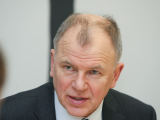Lolita Samuolienė, who is a GP, has opted for private medicine thirteen years ago, when she applied for assistance from the EU Phare programme and founded a private clinic.
“At the time, EU funds were used to encourage the creation of private family doctor cabinets. There were even talks of one day having the entire primary care taken over by the private sector. It was scary a little, since no one knew anything for sure,” the 46-year-old family doctor recalls.
Doubts notwithstanding, she went for it and became one of the first medicine doctors in Marijampolė district to make a transition from public to private medicine.
Stitching wounds to joint punctures
Today, Samuolienė's clinic has about 1,900 patients and eight employees: two family doctors, three nurses, a dentist, a gynaecologist who comes once a week for three hours, and a manager. The latter is also Samuolienė's husband.
“When I am asked what [my husband] Samuolis does, I tell them: I'd rather you asked what it is that he does not do. He mows the lawn, clears snow, signs contracts, oversees finances, accompanies me on night calls,” she lists her husband's duties.
The clinic is officially open 8 AM to 4 PM, but Samuolienė says her working hours are whatever her patients need: “Everyone has my home and my mobile phone number that they can call at any time of day.”
She is not used to referring her patients to other practitioners: “If the problem is within my competence, I always take the initiative myself. I do not send a person to a laryngologist just to have an ear cleared. If a patient has something in his eye, I just take it out – it doesn't take longer than a couple of minutes. Signing a referral is the easiest way, but one develops one's skills by practising. So we do everything: stitching wounds, joint puncture. I can take a blood sample from a vein or set up an intravenous drip,” Samuolienė says.
Her clinic meets all EU requirements for such institutions – it can do general blood and urine tests, owns two electrocardiographs, one stationary and one mobile.
“We even have a defibrillator, a dental x-ray machine, we can run a c-reactive protein test which is one of the best inflammation indicators. My husband sometimes reproaches: Woman, you spend to much on tests. But how can you send a person home without running a blood test?” she asks.
You can't take away a pauper's staff
Working at a private clinic, Samuolienė can plan her hours flexibly.
“I am not forced to see four patients an hour. I know my patients well and I can tell who will need thirty minutes of my time – some are more talkative.
“There are other fine points, too. For example, this week I treated four people without insurance. I cannot just drive them away, but how can I ask for their money? I cannot take away a pauper's staff. Things might be different in cities, but here, in the country, people are part of the community, we are responsible for one another,” Samuolienė says.
Health Minister Andriukaitis: “This is unfair”
 |
| Juliaus Kalinsko/„15 minučių“ nuotr./Vytenis Povilas Andriukaitis |
People in the neighbourhood might well call Samuolienė Dr Quinn, after a big-hearted American TV character played by Jane Seymour. Meanwhile Health Minister Vytenis Povilas Andriukaitis, who is the one set to reform the system, would probably use a different word, “privatininkas.” The term, reeking of soviet-era connotations, used to refer, somewhat derogatorily, to individuals engaging in private enterprise in a predominantly state-run economy.
The minister uses the word when he speaks of owners of private medicine centres who “lure” patients from public clinics and are paid from public health insurance funds for the services they render.
The minister thinks this scheme constitutes an attempt on their part to lay their hands on the National Health Insurance Fund. “It [the money] gets easily pumped into private pockets, leaving public hospitals struggle in poverty and people resent that we cannot provide free healthcare for want of funds. This is unfair,” Andriukaitis has said on TV broadcast “Savaitės komentarai” (“Weekly Comment”).
Equipment upgrade a burden
In Lithuania, patients have a right to receive assistance at a primary medical care institution of the easiest access; the institutions, in turn, have a right to sign contracts with a local Health Insurance Fund to arrange compensation for their services. In other words, health insurance money follows the patient.
All patients are divided into seven age groups that are assigned different healthcare rates – compensation for providing primary care for them. Treating babies and the elderly are the top-paid categories. It is estimated, though, that, on average, one patient brings the clinic he or she is signed up with 160 litas (46 euros) from the Health Insurance Fund per year.
Samuolienė makes no secret of the fact that her clinic would not survive if the fund denied her access to health insurance of her 1,900 patients.
“A patient from the provinces cannot afford to pay for medical services himself, so we do not charge any extra. We are doing very modestly, counting every penny,” the clinic owner assures.
Over a decade of operation, her clinic did not earn any profit. More than that – the company has liabilities to banks. “We have put our own money into it, since EU support was not enough. The investment hasn't paid off yet. Moreover, we need to think about upgrading some of our equipment – it is a sore issue indeed. A blood analyzer set us back 28 thousand litas – this was insane money for us,” Samuolienė recalls.
“Capital bankruptcy”
When she heard Minister Andriukaitis talking about healthcare reforms, which would have restricted access to National Health Insurance Fund to public institutions only, Samuolienė was alarmed.
“This would mean capital bankruptcy,” she says, indicating the decision is a matter of life and death for her business. If the reform were pushed through, she would go under along with all other private medical centres in town. As of today, there are 15 of them in Marijampolė.
Some 30 thousand patients are signed up with public Marijampolė Polyclinic. Another 30 thousand are patients of private institutions. “Can you imagine what to do with all those people coming back to the Polyclinic? And where to put the doctors – provided, of course, they come back to public employment instead of opting for emigration?” Samuolienė wonders.
Unwelcome in cities
True, her situation might be somewhat better than it might be assumed. Minister Andriukaitis has noted that private family doctor cabinets could be allowed to operate in places where there is a shortage of public primary care institutions and the state sees no sense in setting them up. In other words, private doctors are welcome in the provinces, but not in the major cities.
Following this logic, Šilainiai Family Health Centre in Kaunas, run by Liudvikas Borisevičius, would be among the first private institutions to make into the black list. The clinic was founded in 2000, also with the assistance of Phare.
It started off as a venture of four family doctors, but now the centre employs a staff of 60, providing services to 11,000 patients. There is a public clinic in the vicinity.
This would imply that Borisevičius's centre skimmed the cream off the “clientèle” of this clinic – mostly young and relatively healthy patients who nevertheless receive the same funding from the National Health Insurance Fund as the ailing elderly who mostly stayed in public care. At least this is what Minister Andriukaitis accuses “privatininkai” of in his public statements.
“Have you ever seen a sign on a private family medicine centre saying: “Only young and healthy are welcome”? This is ridiculous. A patient once told one of our physicians: “Doctor, wherever you go, I'll follow.” Doctors in public clinics have to treat patients of all ages, and so do we here,” insists Borisevičius, who is also a representative of the National Association of Primary Healthcare Institutions.
Vaccination bonus
In total, 26 percent of the National Health Insurance Fund goes to private clinics for providing primary care services to insured patients.
In January 2012, over 890 thousand patients were signed up with private medical institutions in the country. This means that, should the reform be implemented, almost one third of the population would have to go back to public institutions, unless they'd be willing to pay for the services.
“There are no great profits or returns in medicine. The minister says we are making a fortune. But the money we get from the Health Insurance Fund for services does not cover our costs. As a matter of fact, all primary care institutions are paid equally, so one could argue, following the minister's own logic, that public clinics are making a fortune as well. But we all see it is not the case – so why demonize privately employed physicians? Since we do not charge extra for primary care, we make some additional revenues from extra services: vaccination, company employees examinations, tests that are not covered by the National Health Insurance Fund, etc.” Borisevičius says.
Unprofitable business
It is estimated that profit margins for private medical institutions that have been in business for about ten years is 3 percent. Meanwhile other businesses expect much bigger returns after five years.
Jūratė Dambravienė, director of Medea consulting clinic chain in Druskininkai, Alytus, and Šilutė, notes that the seven-year-old business has not yet returned the investment.
“Taking up medical business means you are always in the red. The problem is that, due to perpetually changing state policies, we are an unreliable sector, so it is hard to negotiate cheap loans from banks that appreciate the risks,” she says.
Over the seven years in business, 2.2 million litas have been invested into Medea clinic chain. It employs 74 people. While some clinics manage to break even or make modest profits in some years, most still lose money, she says.
According to Dambravienė, should Minister Andriukaitis push through his reform and effectively ban private institutions from signing contracts with the National Health Insurance Fund except for services that public clinics are unable or unwilling to provide, the entire private medicine will be pushed off the cliff.
Representing patients, Vida Augustienė, chairwoman of the Council of Lithuanian Patients' Organizations, is also critical: “Our position is clear: all people pay contributions to the Health Insurance Fund. That means that everyone is entitled to his or her share of the fund. As things stand today, patients have a right to choose an institution and a doctor that he or she wants to be treated by, but should the restrictions be put into effect, this right will be violated. The minister says: if you want to go to a private clinic, go ahead and pay! But I wish to have a choice among private and public institutions and be equally compensated.”
No basis for alarm
Algis Sasnauskas, director of the National Health Insurance Fund, says:
“I'd like to clear the air about the uneasiness in the public regarding the proposed changes to the Law on Health Insurance. Private and public institutions alike have no basis for alarm, since these changes would have no effect on their operations. They would continue running as they used to, while the contracts public and private centres have with local Health Insurance Funds would set forth the terms for compensating from the Compulsory Health Insurance for services rendered.
“The changes would put no restrictions on setting up new private centres – this would be allowed just as before. Whoever is saying otherwise is simply spreading misinformation.
“The afore-mentioned terms of signing contracts [between Health Insurance Funds and medical institutions] is not a novelty for healthcare service providers – it is something that has been around for several years, based on the scheme approved by the healthcare minister. Until now, the signing of such contracts was regulated by legal implementation acts, whereas the current motion is to incorporate this into the Law on Health Insurance.
“Healthcare insurance funds must be distributed rationally and efficiently – they must be directed to areas where people have least access to healthcare services.”













